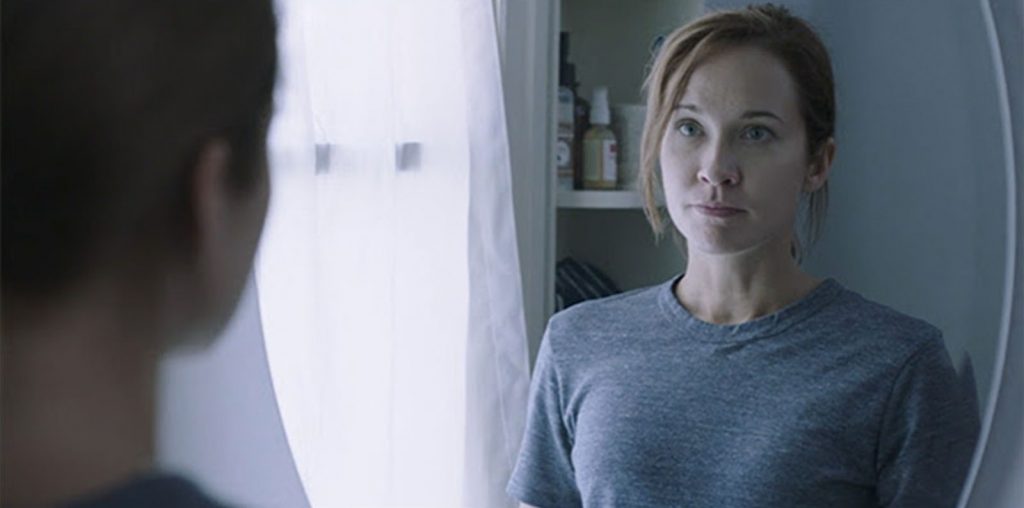
The scariest true story I ever heard someone tell me was about an acid flashback that a friend of ours had. Seems she walked into a room, then turned around and saw herself walking into the room.
Now if the thought of having something like that happen to you for real doesn’t shrivel your goodies right up into your throat, you seriously need to get in touch with your human side.
Mirrors are terrifying for some reason. You can’t look away from your reflection and it sometimes shows things you don’t want to see. It’s got to be even worse if you’re a twin. Every time you’d look at yourself you’d feel an odd disassociation, as if you were looking at your sibling instead. Can you imagine how much that could screw with your mind after a while?
Trouble is the story of how happily married photographer Matyas discovers that his mother is dead via an invitation from an attorney for a reading of the will. That same letter also informs him of the existence of a twin brother named Thomas that he never knew about. Since Matyas was raised in an orphanage and remembers nothing before the age of 6, this is all naturally shocking to him.
Director Harry Cleven handles the first meeting between Matyas and Thomas with such flair that as you watch all you can think of is “Oh yeah, that’s exactly how it would be, if someone really did see their adult twin for the first time, that’s how they’d act.”
The discovery of his twin pushes Matyas on the edge a bit. His wife Claire is about to give birth and he has a phobia about blood. He wasn’t there to witness the birth of his first child Pierre (The kid’s now around 4 or 5) so the idea that he might not be able to be there the second time preys on his mind. This whole twin business isn’t helping him relax.
What’s worse is that Thomas is a really nice guy. He’s gentle and caring, soft-spoken. Matyas’ family takes to the brother quickly. Which disturbs Matyas to a degree he can’t even vocalize.
Naturally the bulk of conversation between Matyas and Thomas comprises of Matyas asking the very obvious question of why hell did their mother send him to the orphanage but not Thomas; and here is where the film begins to slowly become creepy. Thomas is elusive in his answers in the same way that used cars salesman sound soooooooooo honest when they’re telling you that the car you’re gonna buy is showroom fresh and it’s only when you hear your transmission rattle as you pull into your driveway in your “new” car that you realize how slick this guy was.
Matyas believes Thomas at first, but for every question answered there seems to be ten popping up, and even the silk tongued Thomas can’t explain away the bruises on his wife Elina’s face or the fact that the twin’s father is still alive yet remained oddly unmentioned during all their talks.
As the film progresses Matyas becomes progressively more vicious and angry and begins to seriously freak out his family; while Thomas remains the same aloof yet nice guy he was since the beginning.
It eventually becomes obvious that one of the twins has some serious mental problems, but which one? The brilliance of Harry Cleven’s screenplay is that both brothers eventually begin to look pretty damn suspicious. When Matyas goes to visit his father for the first time, the old man’s reaction is so extreme that you begin to ask yourself. Why DID they send Matyas away? What did he do to deserve that? Why does the sight of blood affect him so much? Why does he keep having flashbacks about a straight razor?
By the mid-point in the film Matyas’ wife and son become seriously frightened of him, and to be honest his behavior wouldn’t exactly inspire me much confidence either. Even though we still suspect Thomas, he’s starting to look a lot less weird than Matyas.
It all comes to a head when Matyas’ wife is beaten up and we’re not sure which one of the two did it, or why.
When we finally do find out what’s going on, Cleven leaves plenty of room for nuance in the revelation. The ending is also very French, almost “Truffault-esque” in the sense that it’s loaded with doom and irony.
I said last year, after seeing High-Tension, that I couldn’t wait to see what the French had up their sleeves next. Well, this is it, and it was worth the wait.
